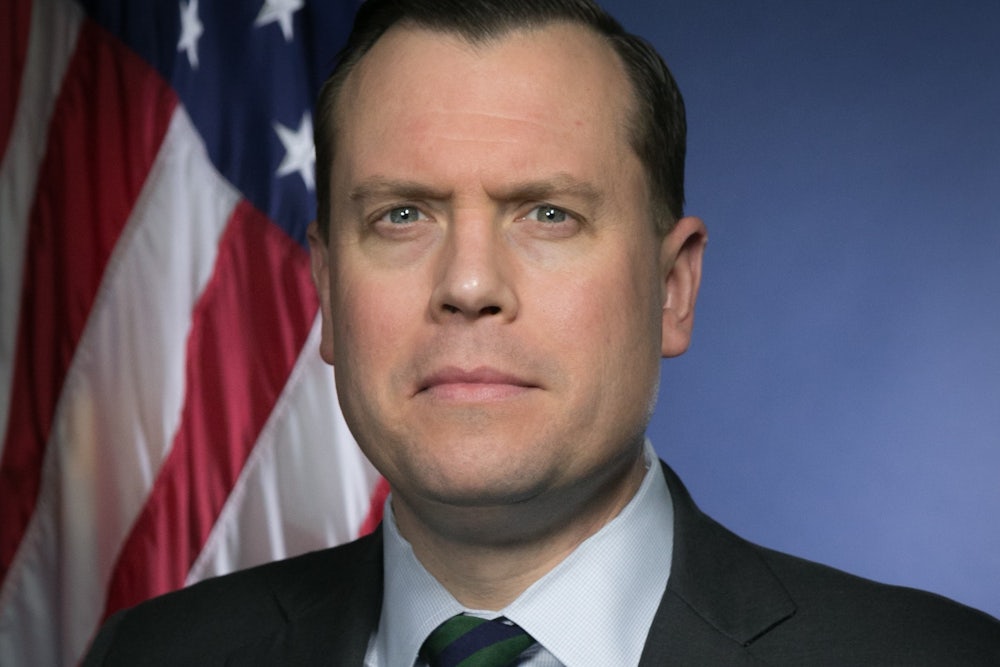The Republican candidate for Kentucky attorney general, Russell Coleman, has promised throughout his campaign to be tough on crime. “Back the blue,” says his website, which describes him as a “career lawman” who “will protect you from violent criminals.” But a look at his time as U.S. attorney for the western district of Kentucky shows he is neither tough on criminals nor any good at keeping promises.
Kentuckians will go to the polls on Tuesday—and if Coleman is elected, he will be in charge of enforcing both state and federal laws in Kentucky. As attorney generals throughout the country begin to wield outsize power over their state’s policies, it’s critical to look at what Coleman’s record actually is.
Throughout his campaign, Coleman has sworn to be tough on crime, a popular Republican talking point. He has repeatedly stressed his commitment to protecting families, particularly children, and highlighted his relationship with state police, citing his past experience as U.S. attorney. Donald Trump appointed Coleman as U.S. attorney in 2017, and Coleman served in that office until January 2021.
While Coleman was in office, current Democratic Governor Andy Beshear defeated incumbent Matt Bevin in a major upset, in 2019. The outgoing Republican governor retaliated against voters by issuing a barrage of highly controversial pardons just before he left office.
From November to December 2019, in what can only be described as a temper tantrum, Bevin issued more than 650 pardons and commutations for people who had been convicted of violent crimes, including murder and child rape. Lawmakers across the spectrum demanded an investigation into his actions, which the then state Senate majority leader, Republican Robert Stivers, called “a travesty and perversion of justice.”
At the time, Coleman expressed deep concern over the pardons and commutations, and promised to try to “aggressively prosecute” cases regarding the people who had received clemency. He was particularly outspoken about those convicted of sex offenses, who, under a state pardon, did not fall under any post-release supervision and were not required to register as sex offenders, the Courier Journal reported.
At least 100 clemency recipients fell in Coleman’s jurisdiction. But by the time he left office, Coleman had prosecuted just two—and both, in what now seems to be his classic style, received plea deals and low sentences.
When contacted by The New Republic for an explanation, Coleman said he had “aggressively prosecuted the cases where we had federal jurisdiction and the statute of limitations had not run. Full stop.”
“Any accusation otherwise is both misinformed and a totally false, 11th-hour liberal smear,” he said in a statement.
The only person convicted of sex crimes whom Coleman prosecuted was a man named Dayton Ross Jones. At a party in 2014, Jones took turns with other people violently raping an unconscious 15-year-old boy with a foot-long sex toy. Jones also took a video of the assault, which he shared on Snapchat.
The attack perforated the victim’s bowel, and he nearly died of his injuries, the Courier Journal reported.
Jones was convicted in 2016 of sodomy on a victim incapable of consent, wanton endangerment, and distributing matter portraying a sexual performance by a minor. He was sentenced to 15 years in prison.
But three years later, Bevin commuted Jones’s sentence to “time served.” Bevin’s executive order was unclear whether Jones had been fully pardoned, meaning his punishment and any other consequences were fully removed, or had been granted a commutation, which reduces the length of punishment but keeps other consequences in place (such as registering as a sex offender).
Coleman’s office announced in April 2020 that it had arrested Jones and issued a federal child pornography charge against him for the same case. If convicted, Jones would have faced up to 30 years in prison.
But instead, Coleman’s office offered Jones a plea deal. Jones pleaded guilty to the child pornography charge in October 2021, and he agreed to help federal authorities with a drug trafficking investigation. He was ultimately sentenced the following year to just eight years in prison. The information he provided federal authorities did not produce any arrests, Assistant U.S. Attorney Jo Lawless said in May 2022.
The only other person Coleman prosecuted was Kenneth Embry, who had initially been imprisoned for possession of a controlled substance. Coleman announced in August 2020 that Embry was being federally charged with armed drug trafficking. Embry allegedly trafficked methamphetamines in April 2020, so he had actually committed a new crime after Bevin commuted his sentence.
But Coleman’s office then offered Embry a plea deal, which Embry took. He pleaded guilty to possession with intent to distribute methamphetamine and possession of a firearm by a prohibited person. The government dropped a third charge of possession of a firearm in furtherance of drug trafficking and recommended a sentence of 10 years, the minimum sentence. Embry was sentenced to 10 years in prison in April 2021.
Coleman did not bring charges against any other clemency recipients, even though at least 114 committed their original crimes in his jurisdiction. This number could be even higher, because Bevin granted pardons and commutations to 398 whose crimes were in unknown jurisdictions. It’s possible that some of those crimes could have fallen under Coleman’s purview.
Some of those people whom Coleman promised to prosecute—but didn’t—include a man who sodomized and sexually abused his 6-year-old stepdaughter, a man who shot his own parents dead with a rifle, and a man who hired a hit man to kill his business partner for insurance money.
As Coleman said, it’s possible that he may simply have been unable to bring charges against the other clemency recipients. Bevin’s pardon may have prevented Coleman from prosecuting some of them, or their crimes may not have risen to the level of federal charges.
But Coleman is quickly showing that he has a record of promising to do one thing and then doing something completely contrary to his initial plan. It makes it harder to trust the promises he makes about what he will do if he wins when he has shown he doesn’t always stay true to his word.






